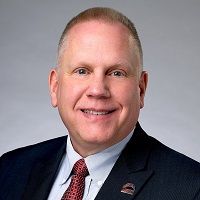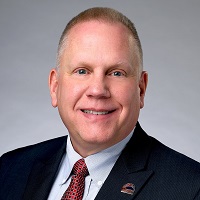Are You Jeopardizing Your Future to Help Your Adult Kids? An Expert Guide for How to Not Do That
If your adult child needs financial help, of course you want to provide it, but crafting a plan that also protects your financial and emotional well-being is vital.


Profit and prosper with the best of Kiplinger's advice on investing, taxes, retirement, personal finance and much more. Delivered daily. Enter your email in the box and click Sign Me Up.
You are now subscribed
Your newsletter sign-up was successful
Want to add more newsletters?

Delivered daily
Kiplinger Today
Profit and prosper with the best of Kiplinger's advice on investing, taxes, retirement, personal finance and much more delivered daily. Smart money moves start here.

Sent five days a week
Kiplinger A Step Ahead
Get practical help to make better financial decisions in your everyday life, from spending to savings on top deals.

Delivered daily
Kiplinger Closing Bell
Get today's biggest financial and investing headlines delivered to your inbox every day the U.S. stock market is open.

Sent twice a week
Kiplinger Adviser Intel
Financial pros across the country share best practices and fresh tactics to preserve and grow your wealth.

Delivered weekly
Kiplinger Tax Tips
Trim your federal and state tax bills with practical tax-planning and tax-cutting strategies.

Sent twice a week
Kiplinger Retirement Tips
Your twice-a-week guide to planning and enjoying a financially secure and richly rewarding retirement

Sent bimonthly.
Kiplinger Adviser Angle
Insights for advisers, wealth managers and other financial professionals.

Sent twice a week
Kiplinger Investing Weekly
Your twice-a-week roundup of promising stocks, funds, companies and industries you should consider, ones you should avoid, and why.

Sent weekly for six weeks
Kiplinger Invest for Retirement
Your step-by-step six-part series on how to invest for retirement, from devising a successful strategy to exactly which investments to choose.
As life gets more expensive, one trend is accelerating: Parents are providing ongoing financial support to their adult children.
It might start with help covering rent, student loans or groceries, but more often, that support stretches further than expected. This generosity, while well-intentioned, can chip away at a parent's budget and derail financial goals.
I don't think anyone plans to be their child's financial backup indefinitely. But between high housing costs, job instability and student debt, many young adults need a hand to stay afloat.
From just $107.88 $24.99 for Kiplinger Personal Finance
Become a smarter, better informed investor. Subscribe from just $107.88 $24.99, plus get up to 4 Special Issues

Sign up for Kiplinger’s Free Newsletters
Profit and prosper with the best of expert advice on investing, taxes, retirement, personal finance and more - straight to your e-mail.
Profit and prosper with the best of expert advice - straight to your e-mail.
The Kiplinger Building Wealth program handpicks financial advisers and business owners from around the world to share retirement, estate planning and tax strategies to preserve and grow your wealth. These experts, who never pay for inclusion on the site, include professional wealth managers, fiduciary financial planners, CPAs and lawyers. Most of them have certifications including CFP®, ChFC®, IAR, AIF®, CDFA® and more, and their stellar records can be checked through the SEC or FINRA.
I've seen parents step in with everything from cosigned loans to early inheritance gifts. In many cases, they don't think of it as a risk — it's just helping family.
Financial help can add up fast
But the reality is, these gestures add up. I've worked with members of Affinity Federal Credit Union who have delayed retirement, paused saving, even dipped into emergency funds meant for health care or home repairs.
Some take on new debt to keep helping, assuming they'll catch up later. That's a hard cycle to break.
What doesn't get talked about enough is the cost of this support, which is not just financial, but emotional. Some trade-offs I see regularly include reducing retirement contributions, scaling back on health care or postponing life goals such as relocating or downsizing.
Other parents take out Parent PLUS or personal loans to cover a child's education or help with a mortgage. Parents do this out of love, no question. But few stop to ask: "Can I afford this without compromising my own future?"
Think of boundaries as tools
I encourage parents to think of boundaries not as barriers, but as tools that protect everyone involved. Being clear about what you can offer — and what you can't — prevents misunderstandings and keeps financial conversations grounded in reality.
At Affinity, we often guide members through these discussions with their children. That might mean setting a timeline for rent support or encouraging the child to contribute to household expenses.
When handled openly, these conversations actually strengthen family dynamics rather than damage them.
Community-based institutions such as Affinity are built for such moments. They help members make thoughtful decisions, not just take out a loan.
Looking for expert tips to grow and preserve your wealth? Sign up for Building Wealth, our free, twice-weekly newsletter.
That help might include financial coaching, planning tools that show how continued support could affect your retirement timeline or loan structures that minimize risk for older members who still want to help.
They also offer resources for mental well-being, because the stress of supporting others financially often takes an emotional toll.
Conversations head off misunderstandings
We've seen how impactful it can be when families engage in intergenerational planning. Parents and adult children who sit down with a neutral financial expert tend to come away with more clarity, fewer misunderstandings, and a better sense of shared responsibility.
Those conversations can be uncomfortable, but they're often the turning point toward independence on one side and peace of mind on the other.
Supporting adult children isn't the issue — the issue is doing it without a plan. You can be generous without putting your own future at risk. The key is being honest with yourself, and with your kids, about what's sustainable.
Your financial well-being matters. It's what makes you able to help in the first place.
Related Content
- Three Ways to Help Your Adult Children Without Spoiling Them
- The Real Cost of Funding Adult Children: Postponing Retirement
- Children Can't Afford to Fly the Nest? Here's How to Help
- Should You Help Your Adult Children Buy a Home?
- Six Strategies for Retiring on a Fixed Income
Profit and prosper with the best of Kiplinger's advice on investing, taxes, retirement, personal finance and much more. Delivered daily. Enter your email in the box and click Sign Me Up.

Kevin Brauer, a distinguished finance industry professional with over three decades of experience, has been at the helm of Affinity Credit Union as CEO and President since January 2023. His substantial contribution to Affinity over the past seven years has been instrumental in propelling the firm's value proposition and innovating its financial well-being initiatives. Brauer leads Affinity's dedicated team of 500 employees at its Basking Ridge, N.J., headquarters and throughout its 18-plus branches.
-
 Nasdaq Leads a Rocky Risk-On Rally: Stock Market Today
Nasdaq Leads a Rocky Risk-On Rally: Stock Market TodayAnother worrying bout of late-session weakness couldn't take down the main equity indexes on Wednesday.
-
 Quiz: Do You Know How to Avoid the "Medigap Trap?"
Quiz: Do You Know How to Avoid the "Medigap Trap?"Quiz Test your basic knowledge of the "Medigap Trap" in our quick quiz.
-
 5 Top Tax-Efficient Mutual Funds for Smarter Investing
5 Top Tax-Efficient Mutual Funds for Smarter InvestingMutual funds are many things, but "tax-friendly" usually isn't one of them. These are the exceptions.
-
 Nasdaq Leads a Rocky Risk-On Rally: Stock Market Today
Nasdaq Leads a Rocky Risk-On Rally: Stock Market TodayAnother worrying bout of late-session weakness couldn't take down the main equity indexes on Wednesday.
-
 Quiz: Do You Know How to Avoid the 'Medigap Trap?'
Quiz: Do You Know How to Avoid the 'Medigap Trap?'Quiz Test your basic knowledge of the "Medigap Trap" in our quick quiz.
-
 5 Top Tax-Efficient Mutual Funds for Smarter Investing
5 Top Tax-Efficient Mutual Funds for Smarter InvestingMutual funds are many things, but "tax-friendly" usually isn't one of them. These are the exceptions.
-
 Why Invest In Mutual Funds When ETFs Exist?
Why Invest In Mutual Funds When ETFs Exist?Exchange-traded funds are cheaper, more tax-efficient and more flexible. But don't put mutual funds out to pasture quite yet.
-
 We Retired at 62 With $6.1 Million. My Wife Wants to Make Large Donations, but I Want to Travel and Buy a Lake House.
We Retired at 62 With $6.1 Million. My Wife Wants to Make Large Donations, but I Want to Travel and Buy a Lake House.We are 62 and finally retired after decades of hard work. I see the lakehouse as an investment in our happiness.
-
 Social Security Break-Even Math Is Helpful, But Don't Let It Dictate When You'll File
Social Security Break-Even Math Is Helpful, But Don't Let It Dictate When You'll FileYour Social Security break-even age tells you how long you'd need to live for delaying to pay off, but shouldn't be the sole basis for deciding when to claim.
-
 I'm an Opportunity Zone Pro: This Is How to Deliver Roth-Like Tax-Free Growth (Without Contribution Limits)
I'm an Opportunity Zone Pro: This Is How to Deliver Roth-Like Tax-Free Growth (Without Contribution Limits)Investors who combine Roth IRAs, the gold standard of tax-free savings, with qualified opportunity funds could enjoy decades of tax-free growth.
-
 One of the Most Powerful Wealth-Building Moves a Woman Can Make: A Midcareer Pivot
One of the Most Powerful Wealth-Building Moves a Woman Can Make: A Midcareer PivotIf it feels like you can't sustain what you're doing for the next 20 years, it's time for an honest look at what's draining you and what energizes you.